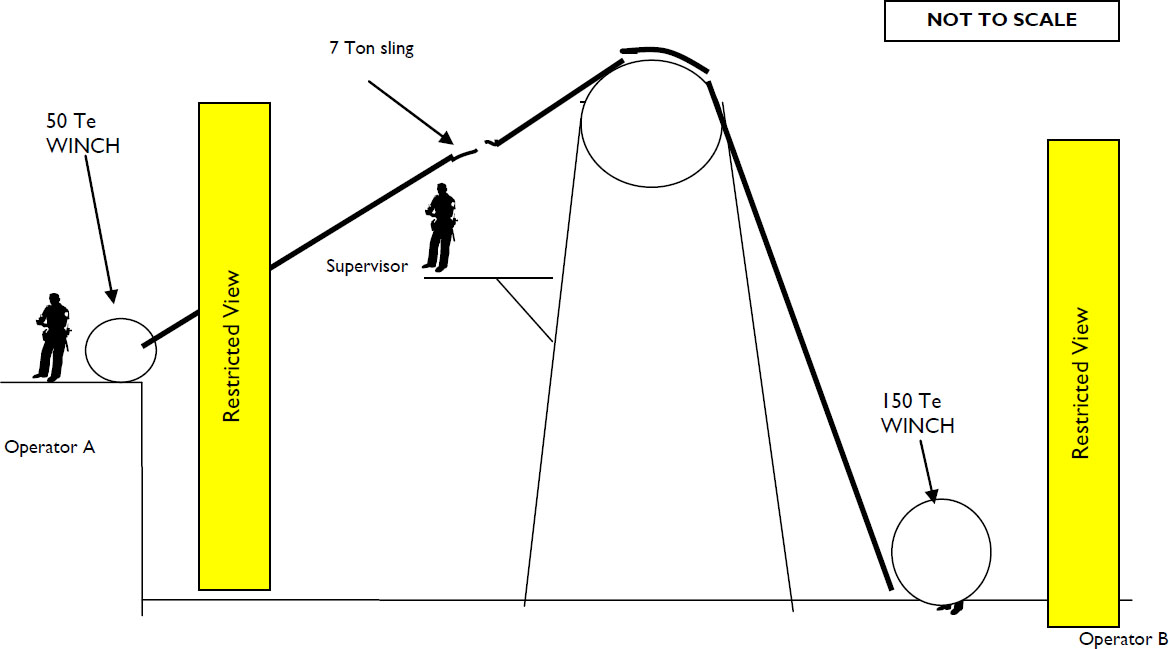Incident during winch-to-winch wire transfer operations
A member has reported a serious incident which occurred recently on an offshore vessel when a 7 ton SWL wire sling parted.
From the diagram below, it can be seen that the operation was totally reliant on the use of co-ordinated radio communications, as both winch operators were unable to maintain a line of sight with the operation.

As the wire connection arrived at the work platform, the supervisor called an ‘all stop’, which was not heard by ‘Operator A’. The 50te winch continued to pull the 150te winch wire and the resulting tension caused the trip on the 150te winch to cut out. The 150te winch was fitted with a cut-out switch to prevent overloading, which had been previously set at 32te.
The supervisor called out two more ‘all stop’ commands, that were also not heard by Operator A. The tension in the rigging continued to rise as the 50te winch continued to pull. When the tension reached 42te, the 7-ton wire sling parted and the resulting whiplash destroyed the handrails on the work platform.
From the supervisor calling the initial ‘all stop’ command to the wire parting a total of six seconds had elapsed.
The company issued the following instructions for future operations:
In any winch or crane operation where a line of sight cannot be maintained, it is fundamental to use correct radio procedure and protocol. All such operations are to be subject to a formal JHA and as a minimum a toolbox talk is to be held with all personnel involved in the operation.
- When carrying out lifts or winch operations that are out of the line of vision of the winch/crane operator (normally deemed ‘blind lifts’), ensure that winch/crane operator receives a full briefing of the intended operation. Paint a verbal picture of the manoeuvres that are about to be carried out and do not proceed until he/she gives an acknowledgement of understanding.
- Full radio communication checks are to be made prior to the start of any winch or crane operation where line of sight between the operator and banksman cannot be maintained. If any doubt exists as to the efficiency of the radio communications, the operation must not proceed until full radio contact is established.
- During ‘blind winch/crane operations’ the criticality of the operation is such that the winch/crane operator must acknowledge and repeat all instructions he has received over the radio. The operation must not proceed unless a precise acknowledgement has been received from the winch/crane operator.
- During ‘blind winch/crane operations’ a hand signalling method and more than one banksman is to be used to relay instructions to the winch/crane operator. Each banksman should stand in a position where he/she can be clearly seen by the next person in the chain. All signals should be clear and precise. Wherever possible, the banksman at the load should have a complete overview of the activity.
Safety Event
Published: 1 June 2003
Download: IMCA SF 05/03
IMCA Safety Flashes
Submit a Report
IMCA Safety Flashes summarise key safety matters and incidents, allowing lessons to be more easily learnt for the benefit of all. The effectiveness of the IMCA Safety Flash system depends on Members sharing information and so avoiding repeat incidents. Please consider adding safetyreports@imca-int.com to your internal distribution list for safety alerts or manually submitting information on incidents you consider may be relevant. All information is anonymised or sanitised, as appropriate.
IMCA’s store terms and conditions (https://www.imca-int.com/legal-notices/terms/) apply to all downloads from IMCA’s website, including this document.
IMCA makes every effort to ensure the accuracy and reliability of the data contained in the documents it publishes, but IMCA shall not be liable for any guidance and/or recommendation and/or statement herein contained. The information contained in this document does not fulfil or replace any individual’s or Member's legal, regulatory or other duties or obligations in respect of their operations. Individuals and Members remain solely responsible for the safe, lawful and proper conduct of their operations.
